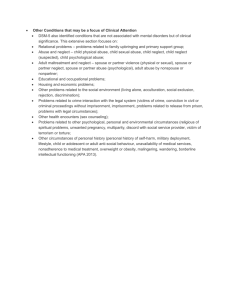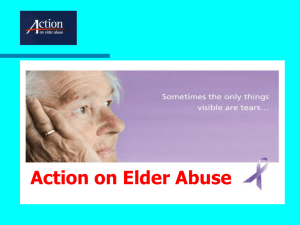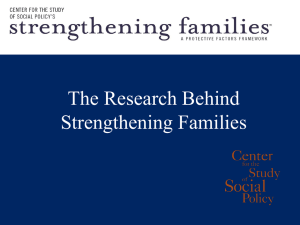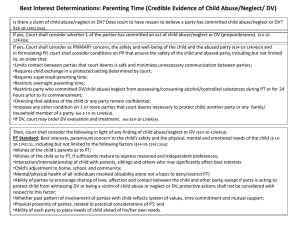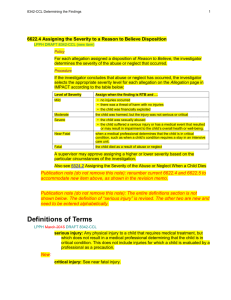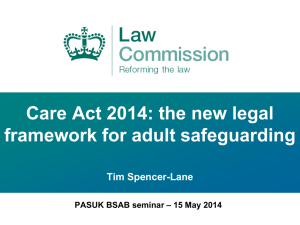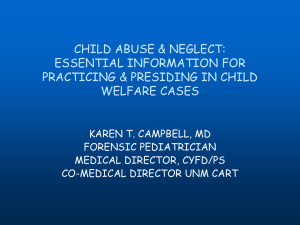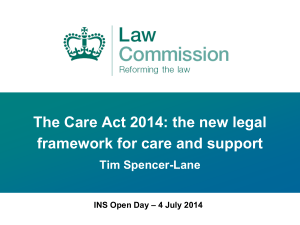Mandatory Reporting High School
advertisement
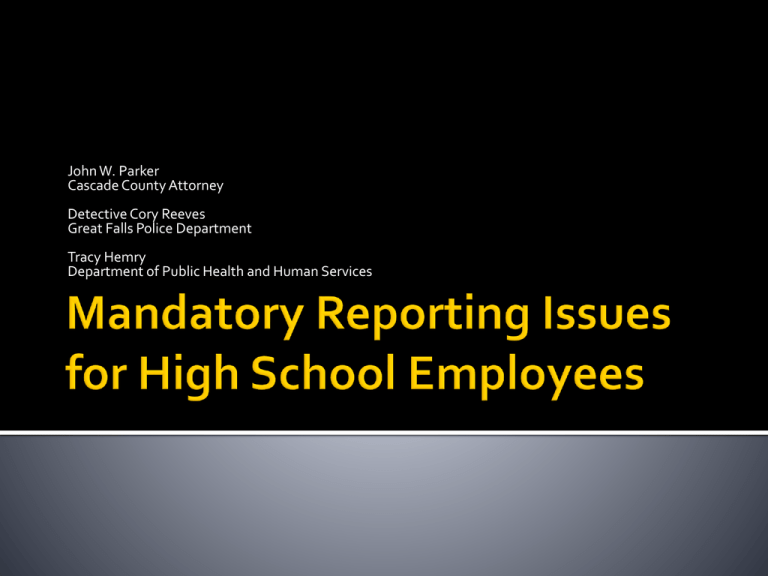
John W. Parker Cascade County Attorney Detective Cory Reeves Great Falls Police Department Tracy Hemry Department of Public Health and Human Services 1. To Explain and Clarify Your Legal Duty to Report Suspected Child Abuse and Neglect 2. To Distinguish Mandatory Reporting of Child Abuse and Neglect from the Parallel Duty to Report Crimes Committed in Schools 3. To Analyze Hypothetical Cases in Order to Develop Shared Understandings of the Law As a teacher, you are constantly focused on achieving education targets and a host of other issues. You hardly have time for a break. As a counselor, you are immersed a whole range of challenges your students are facing. As a food service worker, you have the daily logistical challenge of preparing several hundred nutritious meals. As an engineer, you have to keep the building clean and orderly and ensure heating systems are running properly. The point is, we understand your plate is already full before we even get to the issue of mandatory reporting of child abuse. We want to start this discussion in the context of the realities of your job. We understand many of the pressures you face on a daily basis. The incidence of severe child abuse in our community has risen dramatically in recent years Four child homicides in the past three and a half years Incidents of infants with broken ribs, toddlers with broken femurs, other physical and sexual abuse—inflicted by adult caregivers Reported incidents of neglect in our community have also risen. Youth in Need of Care case filings rose dramatically in 2011: 247 cases in 2011, compared with 152 in 201o. Mandatory reporting laws were designed to make sure State social workers and law enforcement have the information they need to help protect kids. The push for reform began in the early 1960s. Pediatricians led the charge. Recent tragedies in our community continue to remind us why these laws are necessary. We know you are aware of these disturbing cases from media coverage. We also know that in many cases, these young victims, or their brothers and sisters, are your students. You are personally involved in many cases. Clearly, we are all in this together. When a mandatory reporter knows or has reasonable cause to suspect, as a result of information received in a professional or official capacity, that a child is abused or neglected by anyone regardless of whether the person suspected of causing the abuse or neglect is a parent or other person responsible for the child’s welfare, they shall report the matter promptly to DPHHS. The duty also extends to social workers, physicians and other health care workers, mental health professionals, child care providers, and law enforcement. It is NOT your job to investigate or confirm the facts that have been provided to you. It IS your legal obligation to provide the information to CFSD through the centralized intake number. Child Abuse Hotline: 1-866-820-5437 Relaying the information to your principal does not fulfill your duty to report. It is a good practice, however, to share the information so the principal can understand the child’s challenges. In some cases, sharing the info is necessary to ensure security in the school. The statute does not require you to make a written report Ask yourself: would you want one if you had to testify in court? Under the Montana Rules of Evidence, you can make a “refreshing recollection,” but only to a document prepared at the time. You may be wondering why you cannot just call the local office directly. Centralized intake was designed to ensure uniform treatment of the reports across the entire state. Parents in these cases seem to move frequently. CI ensures a record of complaints despite frequent moves. CFSD assesses the threat level. CFSD social workers are called to respond. If the evidence shows the children are at risk, they are removed from the home and placed in a secure setting pending further court action. Every time I’ve been called out on a child homicide case, I always call CFSD within the first hour to determine if there has been a history of complaints. Anonymity will be compromised. No one will do anything anyway. We understand how awkward it is that you’ll be sitting across the table from some of these parents in conferences We hope you understand that the tension is worth it in the long run In addition to your statutory duty to report child abuse and neglect, you have a duty to report crimes committed on your campus. If you do not, you could be potentially held liable for negligence. M.C.A. § 41-5-102 is the declaration of purpose, and seeks to “prevent and reduce youth delinquency through a system that does not seek retribution….” Rather, accountability, supervision, restitution when necessary. Detention in only the most limited circumstances. Student who frequently asks other students for food. Hunger complaints. Wears the same unwashed clothes to school every day for a month. Tells another student that he or she is the oldest sibling at home, left to care for others while parents are out drinking. This fact pattern constitutes neglect. You should call it in to centralized intake. The same holds true for cases of medical neglect. Important reminder: suspicious bruising, broken bone without reasonable explanation, multiple broken bones over time. You smell the strong odor of marijuana emanating from the student’s locker. After the lunch break, you smell the odor of marijuana smoke coming from the student’s clothing. Not child abuse or neglect; rather, a violation of law to be reported to your SRO. Locker room situation One student snaps his friend on the rear with a towel Horseplay, no intent to injure Might be disciplinary, might not. But no violation of state law. What is the duty to report a playground fight? Let’s think through some variations of the situation. Some of these situations can be a close call, but it is best to err on the side of reporting. The main point is to ensure that major incidents are appropriately reported to either CFSD or local law enforcment. Information is the key to protecting children from abuse and neglect!
